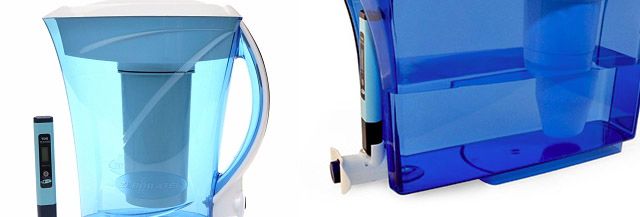We would love to say that ZeroWater pitcher filters are high-performing, well-designed and long-lasting. It would be great to see a company break up the Brita and PUR gridlock that sits atop the world of low cost water filters. Sadly, we cannot give it our full endorsement.
Here’s the deal:
- ZeroWater filters have been NSF certified, so you know that they are effective at eliminating major contaminants, including chlorine.
- They also have a sleek design, and many people have noted that they are more aesthetically pleasing than PUR or Brita products.
- The cost is reasonable. In fact, ZeroWater pitcher filters are comparable to Brita and PUR products.
But all is not rosy in the land of ZeroWater filters.
To start with, the filters are incredibly inefficient. I’ve spoken with some people who claim that the older design on the filters was wider and more straight. This allowed for a greater flow rate. That may be true. If it is, it’s not clear why they changed the design. Perhaps it was for aesthetic reasons? In any case, you can expect to be tapping your foot for a good long while as your water filters, and even as you pour the water, as the spout is also narrow.
The second critique we have is with the filters, which don’t last as long as Brita or PUR filters. What’s worse, however, is that many people experience a problem with taste, especially after several weeks of use. Many users report an acidic or fishy taste in the water.
Some users have reported finding an acidic pH after the water has passed through the filter. In other words, they tested the pH of their tap water, found it was neutral or basic, and then tested the pH after the water went through the ZeroWater filter, and it was acidic. This is very troubling (you can see an example of this here).
So now the question is, why would anyone buy a ZeroFilter when there are other products within the same price range that have better reviews. For example, the PUR pitcher filters are clearly superior. I think a lot of it has to do with design. ZeroWater has crafted a fancy meter for measuring contaminants, and they have a sleek design. These features are certainly welcome, but they shouldn’t persuade anyone to buy the product by themselves. Unfortunately, ZeroWater falls short in several key areas, which we have mentioned above.
UPDATE: In addition to our other critiques, we have also had several people point out that the ZeroWater meter is somewhat misleading. For example, their “zero” reading which is supposed to indicate the purest water may be focused more on the elimination of minerals rather than the elimination of contaminants. This is obviously a problem as minerals are beneficial and trace elements of pharmaceuticals are not. This reinforces our critique that ZeroWater has emphasized aesthetics over function, which is not what you want from a water filter.
If you are a ZeroWater user, please share your experience in the comments below.







{ 3 comments… add one }